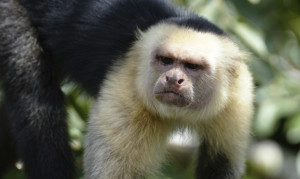
Just like people, some monkeys will take the time and effort to punish others who get more than their fair share. In fact, they can act downright spiteful.
Capuchin monkeys will yank on a rope to collapse a table that is holding a partner monkey’s food. While chimpanzees collapse their partner’s table only after direct personal affronts like theft, capuchins punish more often, even in cases where the other monkey merely has more food.
“One hallmark of the human species is the fact that we’re willing to make a special effort to punish those who violate social norms,” says Laurie Santos, a psychologist at Yale University and senior author of a new study published in the journal Evolution and Human Behavior.
“We punish those who take resources unfairly and those who intend to do mean things to others. Many researchers have wondered whether this motivation is unique to our species.”
Researchers wanted to know if a distantly related primate species would punish the beneficiaries of social inequalities. Like chimpanzees, capuchins did collapse tables to punish monkeys that stole food. But they also punished beneficiaries of windfalls as well.
“Our study provides the first evidence of a non-human primate choosing to punish others simply because they have more,” says first Kristin Leimgruber of Harvard University. “This sort of ‘if I can’t have it, no one can’ response is consistent with psychological spite, a behavior previously believed unique to humans.”
“Our findings suggest that the psychological roots of human-like punishment motivations may extend deeper into our evolutionary history than previously thought.” Santos says.
Source: Yale University and Futurity.org




